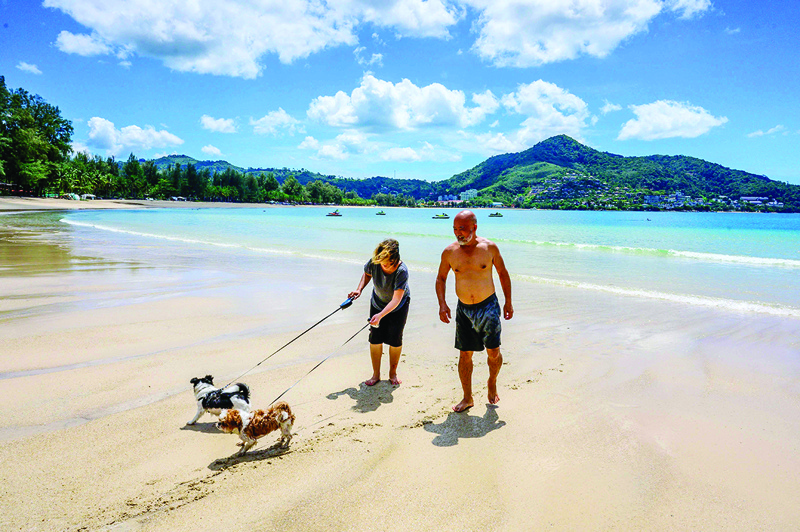 PHUKET: Tourists walk their dogs on a beach yesterday. - AFP
PHUKET: Tourists walk their dogs on a beach yesterday. - AFPPHUKET: Overseas tourists poured into Bangkok and the holiday island of Phuket yesterday as Thailand kickstarted its tourism industry after 18 months of COVID curbs. The coronavirus pandemic hammered the kingdom's tourism-reliant economy, which last year saw its worst performance since the 1997 Asian financial crisis as arrivals dwindled more than 80 percent.
Thai authorities have given the green light to vaccinated tourists from over 60 "low-risk" countries to skip hotel quarantine - providing the sector with a much-needed lifeline. Bangkok's Suvarnabhumi airport and Phuket's international terminal were the first yesterday morning to receive visitors, with mostly European tourists greeted by staff dressed in personal protective equipment to process their documents.
"The paperwork was a big effort and a struggle, but it feels good again to travel and get back to normal life," said German tourist Marcel Florian Popp, 25, after he and his friends passed immigration in Bangkok. In Phuket, Lin Turley, 68, said he and his wife were regular visitors to Thailand before the pandemic and were looking forward to a relaxing month of golf and swimming in the island's clear turquoise waters. "We have just come out of a cold Europe so we are looking forward to some warmth," he told AFP. "We want to relax and enjoy being back in the Land of Smiles."
Visitors are required to take a COVID test upon landing and spend a night at a government-approved hotel to await the results before being allowed to travel freely across the kingdom. By late afternoon, about 1,500 foreigners had landed in Suvarnabhumi airport, said director Kittipong Kittikachorn, adding that he expects half of November's estimated 135,400 visitors to be foreign.
Thailand hopes to capitalize on travelers escaping the winter blues in December, with Kuwait, several European countries, the United States and China on the approved list. "The most important thing that the government and I are thinking right now is to make people's livelihoods return to normal," Premier Prayut Chan-O-Cha said Friday. Tourism accounts for nearly a fifth of the economy and the impact of the pandemic has reverberated across sectors from restaurants to transportation.
But authorities expect 10 to 15 million visitors to return next year, with revenues forecast to surpass $30 billion. Industry insiders are less optimistic, however, especially with regional giant China - the source of the lion's share of tourists - requiring returnees to undergo a strict quarantine program. Thailand is still registering about 10,000 COVID infections a day while only about 40 percent of the population have received two vaccine doses.
Pre-pandemic Thailand saw nearly 40 million visitors arrive annually to stroll its sandy beaches, sample street food and enjoy its nightlife. A pilot re-opening scheme dubbed the "sandbox" kicked off in July, with Phuket allowing fully vaccinated visitors to roam the island paradise for two weeks before being allowed to travel to other areas of Thailand. But it drew just 58,685 visitors in four months, a drop in the ocean compared to the numbers Thailand has come to expect.
Yesterday night, a stretch of bars near Patong Beach's infamous Bangla Walking Street stood mostly deserted as waitresses tried to entice tourists to come in for a drink. The vibe now is "very quiet", said the Gannods from Melbourne, as the couple strolled along the near-empty Kamala Beach, describing it as a huge difference from their previous trips to Thailand. "It's quite sad to see everything closed. We feel for (the small businesses) so we never bargain anymore," said wife Jordan Gannod.
But not everyone is itching for a return to business as usual. Entrepreneurs on Koh Phi Phi - a popular island stop on the booze-fueled backpacker trail - said it was "crazy" pre-pandemic when businesses catered to ever-increasing numbers of tourists engaged in drunken debauchery. "Before it was the cheapest tourists in the world and all they wanted was sex, drugs and alcohol," said Roger Andreu, who works at a dive shop. "We need to make money but it cannot be the same." - AFP










